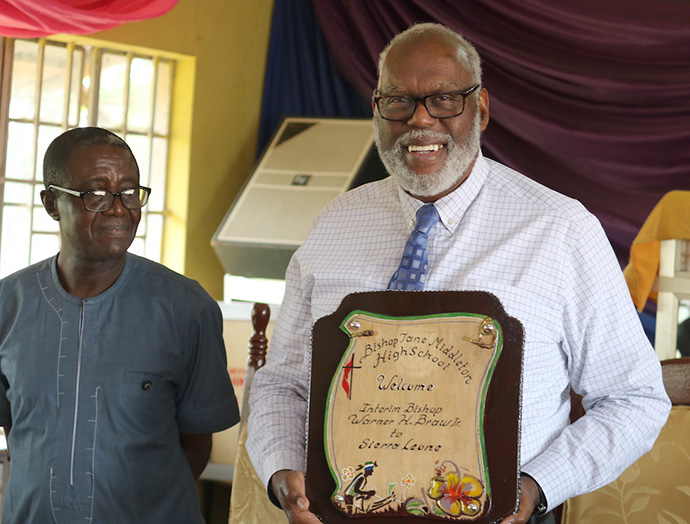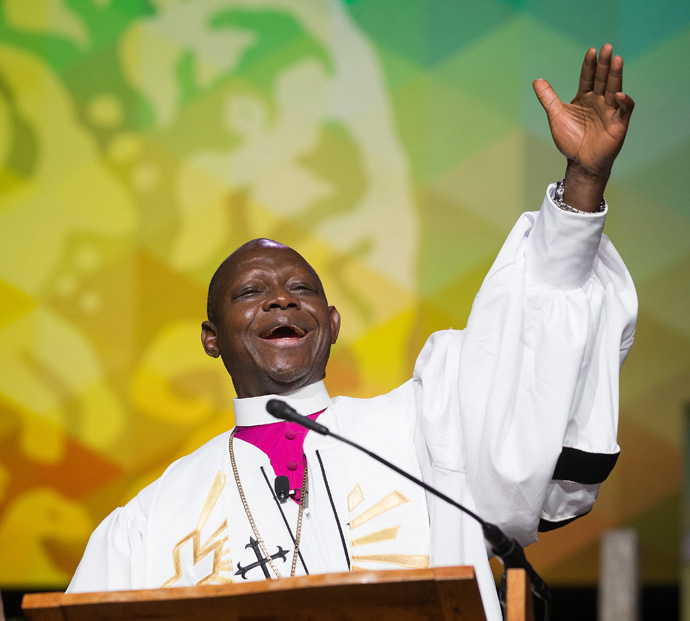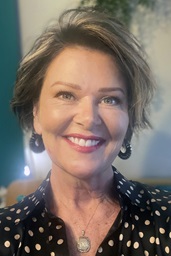Key points:
• Bishop John K. Yambasu of the Sierra Leone Conference died in a car accident in August 2020.
• Bishop Warner H. Brown Jr., who was named interim bishop in October, reflects on the past year of transitional leadership.
• He said he sees his role as a caregiver and strives to prepare the conference for a new episcopal leader in 2022.
After the tragic death of Sierra Leone Conference Bishop John K. Yambasu in August 2020, retired Bishop Warner H. Brown Jr. was named as interim episcopal leader.
Brown served as bishop for 20 years in the Denver and San Francisco areas and as president of the Council of Bishops. He also was a mission partner with bishops and church leaders in Africa, Europe, the Americas and Asia.
Brown will continue to provide leadership in Sierra Leone until the episcopal election projected for 2022. Because of COVID-19 limitations, Brown works virtually from the United States with Sierra Leone Conference leadership. He traveled to Sierra Leone earlier this year to preside over the annual conference.
He recently talked with Phileas Jusu, Sierra Leone Conference director of communications, to reflect on the past year and talk about his hopes for the future.
The following interview was condensed and edited.
Working with you in a virtual environment has given us a new perspective to ministry. What has it been like for you?
It has been wonderful to see the team that Bishop Yambasu built and to see you working so well on so many projects and your many major contributions to Sierra Leone. Working primarily in the virtual format for an extended time is a new way of doing things, but it appears that this is the way of the future.
How did you feel when you were assigned by the Council of Bishops to take over following the death of Bishop Yambasu?
I was shocked and deeply saddened by the news of Bishop Yambasu’s death. He had become someone I admired a great deal, and I really appreciated his wisdom. His death was a great loss to our church around the world. When Bishop Cynthia Fierro Harvey asked me to step into this interim role, I was surprised, honored and encouraged by colleague bishops.
I am happy that I accepted the responsibility. Cultural adaptation and understanding cultural differences are very important and something I value highly. I try my best to understand and operate within the context of the country and to bring my experience so that we might benefit each other. That has been the goal and the challenge.
What are your areas of focus moving forward?
The goal is to successfully complete the implementation of things that were in progress when this transition happened so that we do not lose key projects in the way.
I am in a caretaker role and a coach role. As a caretaker, I’m aware that a new bishop will be elected in 2022. It is important that I pass the mantle of leadership so that the new bishop can step into that responsibility and find a place that is ready to receive them and support their leadership.
This is where the coach role comes in: to encourage and support the leaders who are already on the ground in Sierra Leone. They will have a team prepared to continue the work already underway and to share information and knowledge that will allow new decisions to be made.
Which ongoing projects are your priorities?
Wow! Sierra Leone has an excellent perspective on how the church is seeking to serve — helping to build an infrastructure in education, health, church development and leadership that will contribute to the future of a healthy nation. It’s a priority for me to support that effort. The church has developed partnerships many areas. Each plays a role in the long-term health of the annual conference and the nation.
This is a critical time for the United Methodist University of Sierra Leone. We must maintain momentum to move forward to get the schools that are on the drawing board up and running so that they can contribute to building the necessary income and infrastructure for the university’s successful upgrade. Working with the leadership of the university to accomplish this has been a major project — raising funds to complete the libraries that will allow the school of education and the business school to be accredited so that they can begin receiving students — and training teachers who can work in the schools that we are already operating.
The hospital at Kissy is one project where we have been contributing to the medical health of the country. We come alongside government hospitals to work as partners, not trying to compete, but to be an additional source of resource and support for the well-being of the people and the infrastructure needed in a developing country. We have been fortunate to find partners from around the world who are eager to help us.
Another important area is developing training projects to raise up the next generation of agricultural entrepreneurs. We want to teach students how to apply their agricultural skills to develop a business that will not only feed their family but also feed their village and build a legacy for the future.

When we heard a new bishop from America was coming, expectations were high. Being a bishop in America is different from being a bishop in Africa. What has it been like managing the expectations of the people in the Sierra Leone Annual Conference?
It is understandable to expect the American to have the magic wand to fix problems.
But the reality is that the key to the future of Sierra Leone or anywhere is within ourselves. We must always work to discover how to take responsibility for and deal with the issues at hand.
The challenges can be huge and often frustrating, but that reality does not change the fact that no one is better able than you to know what is needed and to figure out how to make the best of what you have. That is the beginning place, when someone from outside comes to offer help. It is important not to become dependent on that help.
We must work together to be kind to one another, hold one another in love and go forward as best as we can.
Stepping into my interim role in Sierra Leone during this season of COVID-19 is a balancing act. The people have been welcoming and patient with the ways I do not fully understand the culture, when I ask questions about why things are done in a certain way, and when I struggle to pronounce names or understand the differences in geography. Understanding these things is a part of my learning curve. We learn from each other. …
I’m careful in what I ask people to do because I do not want to do harm. That’s an important part of the learning. I think people are also beginning to learn that it is important for them to offer ideas and that I am more than willing to hear, receive and learn from them.
The old style of command-and-control episcopal leadership was popular for a long time. That is not the way the world is operating today, however. In the coaching style of leadership, the leader shares wisdom but recognizes that they don’t have all the answers. Their leadership is enhanced when they ask good questions of the people who work with them. The wisdom of their team supports their leadership. Bringing this approach to leadership is beneficial in building to a strong future.
You spoke about the constraints of working within the COVID-19 environment. How challenging has that been for you?
It is very challenging because I am a people person. But for the COVID-19 environment, I would be more engaged, face to face with the people. I would spend more focused time on the ground on particular projects. Still, even without the pandemic, we could not afford for me to come as frequently as would be desirable for everything. So, we have to be selective.
We probably will learn something from this that will help us to be better in leading the church in the future. But, for me, personally, I enjoy the time such as we had at the annual conference where I can be with the people and they can meet me and see me for who I am. We can pray, praise and share the pain together. It is difficult for me to be this far away. But my heart and my prayers are there. By the same token, we can operate under these circumstances because we have good people on the ground, and I trust them and give them levels of leadership. We all must learn how to hold one another accountable and how to share the work.
At the conference, I saw you wash the feet of newly ordained deacons and elders. That was the first time for some people to see a bishop stoop down and wash the feet of the pastors. What has it been like for you providing spiritual leadership for the annual conference?
I pray mightily in this responsibility. It is consistently a challenge, no matter where you serve. The bishop is one person. Our leadership depends entirely on the work of the Holy Spirit. The same is true of our ministry. We do whatever God allows us to do. Whatever gifts God has given us, we use. I believe in the Holy Spirit, and I trust the Holy Spirit to surround me and surround us in Sierra Leone.
I pray that God will give me wisdom, empower me to do good and protect me from doing harm. All glory goes to God. Jesus modeled this for us. He called disciples and sent them out to do things for which they had no preparation or understanding. They healed the sick and cast out demons because the Holy Spirit was at work around them.
I trust pastors and laity to model their lives after Jesus and to see that I’m trying to do the same thing. The Holy Spirit will make it work.
I was just thinking, we would have had more opportunities to learn if you were with us here physically.
Yes! That is probably so, and I would have more opportunity to learn. But the reality is, that apart from our learning, we must learn to adapt. Our cultural expectations are not always practical.
John Wesley, in the quadrilateral, brought that way of thinking to us. Yes, we have Scripture as the foundation for our teaching and understanding God’s wisdom, and we have the traditions of the church that inform us of how it has been done over the millennia. But we also have been given minds to think and the ability to act in the present context and be accountable for our actions. We learn from our culture and live in the present as wise and faithful people.

Have there been challenges for you?
Operating across seven time zones has been a bit of a challenge. When I accepted this work, I already had a plate full of things on which I was already working. While I could put some of those tasks on the shelf, I had to continue others. I also had to do justice to Sierra Leone. It’s an ongoing balancing act.
What many people don’t realize is that the bishop is not just a bishop in their local area. A significant amount of work and expectations go on beyond the local area, so the bishop has to be present in all of those ways. For instance, I am expected to continue to be a part of the African college of bishops beyond Sierra Leone itself.
Any culture shocks?
I have been to different parts of Africa a number of times. My first time on the continent was almost 50 years ago.
But this is my first time in Sierra Leone. It was delightful to feel the warmth and hospitality of the people, to be received well, and to discover and appreciate the uniqueness of Sierra Leone. I was a bit shocked by the number of people and cars on the street and how we squeeze so many people and vehicles into these narrow streets.
I am impressed that Sierra Leone, having so recently come from a painful civil war, has established a sense of community where neighbors are not divided by tribe or religion, where people work together across the lines that often cause division in other places.
The election of a bishop in 2022 — are there positives? And what are the challenges managing the process?
The challenge is reminding people that we are the church, guided by our spiritual wisdom, not our passions. We get so caught up in, “I want my person to win” that we do it without remembering the purpose. We are looking for the best spiritual and temporal leader. If we prayerfully do that, we will do well. I trust that the people and the Holy Spirit will give the wisdom to select the leader we need. It is my prayer that we do no harm, that we consider the possibility that the “best” person may not be the person we prefer and that we remain open to where the Holy Spirit leads us.
In the end, whoever becomes bishop will be your bishop. Everyone must hold them in their prayers and give them their full support. That’s the challenge.
If we are the people of the church and we commit ourselves to helping the newly elected bishop to succeed, all will be well. If we look for ways to sabotage them because they are not our choice or we do not like them, the church — and all of us — will suffer.
It is a positive when we behave as the children of God. It is a negative when we make our church process another secular political process and we take on the behavior of secular politics where anything is fair game if it helps us win.
What have been your highs and lows?
It has been an honor to step into the place in which Bishop Yambasu, by his life and work, demonstrated the sacredness of God’s work in Sierra Leone. It has been a blessing to come alongside his family and join them in their year of mourning and to see the beauty of this spiritual family that continues his spirit to this day. I continue to pray for them and thank them for their love for the church.
I think it’s really important that as we remember Bishop Yambasu now and always, that we prepare to end our formal season of mourning, look to a future to which he helped contribute and honor him by embracing his family.
How do we keep his memory alive while not being imprisoned by it? How do we continue to work on projects and dreams that he awakened in the people of Sierra Leone? That we do that work well together is exciting. I’m eager to see how you go forward with that work and to see the church continue to prosper.
Jusu is director of communications for The United Methodist Church in Sierra Leone. News media contact: Julie Dwyer at [email protected]. To read more United Methodist news, subscribe to the free Daily or Friday Digests.
Like what you're reading? Support the ministry of UM News! Your support ensures the latest denominational news, dynamic stories and informative articles will continue to connect our global community. Make a tax-deductible donation at ResourceUMC.org/GiveUMCom.




